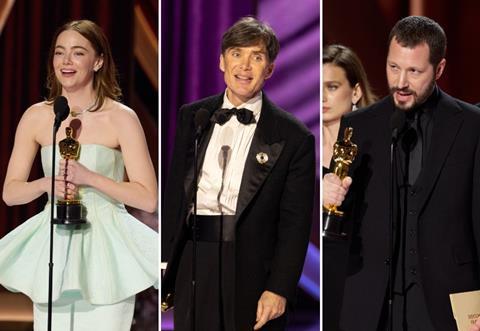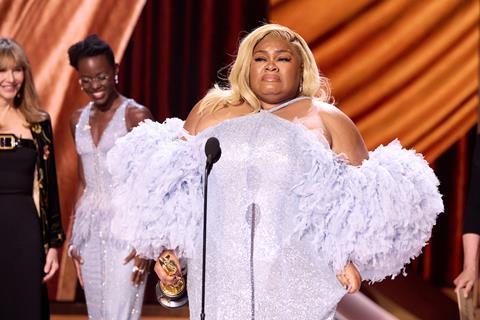
Screen rounds up the key industry talking points from this year’s Academy Awards, which were held last night (March 10) at the Dolby Theatre in Los Angeles.
Oscar follows Bafta roadmap
If the UK film academy is minded to take pride in, and care about, the degree to which the Oscars follow the same path set out at the Bafta Film Awards, then this is a year to give encouragement. This year’s US Academy Awards matched the outcome of last month’s Baftas in 18 feature categories – in everything except visual effects, in other words. The two sets of academy voters agreed on best picture/film, director, both screenplays, all four actors, the three specialised feature categories (animation, documentary and international/film not in English language), and in seven of the eight craft categories that are common to both awards.
In visual effects, Bafta voters plumped for Poor Things, while Ampas went with Godzilla Minus One – not nominated in the category at Bafta.
The massive overlap this year is a marked contrast to 2023, when the two academies delivered different winners in all eight of the major categories. That year, All Quiet On The Western Front dominated the Baftas, whereas it was Everything Everywhere All At Once that swept the Oscars.
The extraordinary overlap this year will be seen as good news at Bafta HQ. The Bafta Film Awards are always held before final-round Oscar voting begins, and Bafta benefits if US studios and streamers believe positive outcomes at the London ceremony impact Oscar voters, helping to bring films to their attention. And the degree to which Bafta is seen as a pathway leading to Oscar also encourages talent to engage with the Bafta Film Awards, and attend the ceremony.
International accent shines through
In a year where members from a record 93 countries voted, the international presence made itself felt among the winners. Oppenheimer may have dominated (with a UK-born director and Irish lead actor telling a very US story) but other US-focused films like Killers Of The Flower Moon, Maestro and, to an extent, Barbie were left out in the cold.
Instead, Poor Things – a US-UK-Irish co-production with a majority European crafts team and a Greek director at the helm – took home four awards including a surprise win for Emma Stone over what would have been a historic win for Native American hopeful Lily Gladstone. This was followed by German-language title The Zone Of Interest (US-UK-Polish) on two awards including best sound while France’s Justine Triet and Arthur Harari beat out a majority US line-up in original screenplay for Anatomy Of A Fall. Japan had a strong showing too with Hayao Miyazaki picking up his second Oscar in animation for Studio Ghibli’s The Boy And The Heron and Godzilla Minus One winning in visual effects.
Hollywood leaves politics aside
A protest calling for a ceasefire in Gaza outside of the Dolby Theatre delayed arrivals but the ceremony went on to be a relatively tame night of politics for the Oscars historically, with only a small number of stars including Mark Ruffalo and Billie Eilish wearing Red Artists4Ceasefire pins.
The Zone Of Interest director Jonathan Glazer commented on the parallels between his Holocaust feature and the current Israel-Hamas conflict, noting: ”Our film shows where dehumanisation leads at its worst. It’s shaped all of our past and present. Right now, we stand here as men who refute their Jewishness and the Holocaust being hijacked by an occupation which has led to conflict for so many innocent people.”
Elsewhere, 20 Days In Mariupol filmmaker Mstyslav Chernov said he would “exchange” his best documentary Oscar for “Russia never attacking Ukraine”; and Oppenheimer star Cillian Murphy dedicated his best actor win to “peacemakers everywhere”.
Studios on top

Streaming companies may have dominated the Oscar nominations but it was the traditional US studios who walked home with most of the trophies on the night. Universal had the biggest tally with seven wins for Oppenheimer; Universal division Focus Features also won one Oscar for The Holdovers. Disney label Searchlight Pictures won five Oscars: four for Poor Things and one for best documentary short winner The Last Repair Shop. Warner Bros had one win for Barbie, which took the statuette for best song.
The streamers came away with relatively few prizes despite their nominations haul. Netflix alone had 19 nominations for films including Maestro, Society Of The Snow and Nyad, while Apple TV+ had 13 nods for Martin Scorsese’s Killers Of The Flower Moon and Ridley Scott’s Napoleon.
Netflix scored just one win for Wes Anderson’s The Wonderful Story Of Henry Sugar in the live-action short film category. Apple walked away empty-handed, while Amazon MGM Studios took home one prize in the adapted screenplay category for American Fiction, produced through its production label Orion Pictures.
Among the independent distributors, A24, which led the rankings at last year’s Oscars for Everything Everywhere All At Once, came away two prizes this year for Jonathan Glazer’s The Zone Of Interest. Neon scored one trophy when Anatomy Of A Fall won the original screenplay prize.
It was also a good night for Japanese studio Toho. It released Godzilla Minus One, which won the visual effects prize, in the US and was also behind The Boy And The Heron, which took the animation trophy, and was released in the US by GKids.
Early birds catch the big prize
Is the awards launchpad axis swinging from the autumn film festivals to much earlier in the year? For the second ceremony running, Oscar’s big winner on the night opened early in the season and sustained and built on awards buzz for months ––– and months. Last year it was the March premiere of Everything Everywhere All At Once at SXSW; this year it was the July release of Oppenheimer.
Many of the other winners and nominees debuted early in the year: Past Lives was at Sundance, The Zone Of Interest, Anatomy Of A Fall, Killers Of The Flower Moon all premiered at the Cannes Film Festival in May and Barbie hit global screens from July. Poor Things, the big winner from Venice (that may or may not have missed out on a Croisette slot for reasons unknown) is the outlier, with Toronto’s People’s Choice Award winner American Fiction (for a period a sure-fire signifier of a future best film winner) settling this year for the adapted screenplay prize.
The timing of the streamer-friendly Venice, Telluride and Toronto film festivals will always be important to awards campaigners (ergo the nominations for Maestro, Nyad, Society Of The Snow, The Holdovers et al) and this year’s strike-hit release schedule suggests the latter part of the year will be significant. But the last two years show an earlier start still could be worth the effort.

























No comments yet